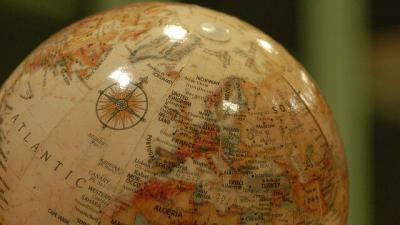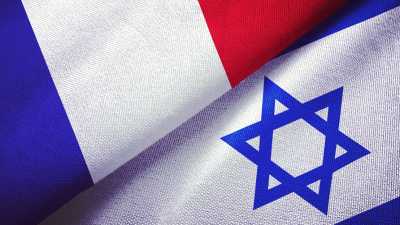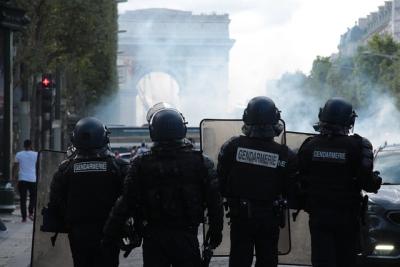It seems increasingly difficult to deny Huntington's claim about the clash of civilisations. Ukraine sees the clash between the Western and Slavic-Orthodox civilisations, and Israel the clash between the West and Islam. According to Huntington, civilisations subjected to westernisation of the world would in reaction strengthen their identity and rebel against the western civilisation. And the Islamic civilisation is most sensitive to that mechanism, because it both feels humiliated by the West and is particularly resistant to the democratic model.
His analysis is interesting in two respects. Firstly, it offers us a general theory capable of describing all current fundamental interactions in a coherent and unified way. And, above all, it allows us to understand the way of thinking of those who have chosen us as their enemies. While our universalism may make it difficult for us to accept this clash of civilisations, the Russian thinker Alexander Dugin and the Chinese thinker Zhang Weiwei, who provide an ideological framework for the imperialist ambitions of Moscow and Beijing, not only fully embrace Huntington's clash of civilisations, but also call for it. They develop the notion of a civilisational state as opposed to the notion of a nation-state, the foundation of our European democracies. For the Russian, the world must aggregate into civilisational states, empires (Chinese, Russian, Turkish, Iranian, Arab/Muslim, etc.), being a form of supranational political organisation with a single strategic decision-making centre (the Emperor) with authority over a civilisational area. To enable this, the West must be defeated, because its hegemony is preventing the advent of this new world order. For the Chinese, the Western model is a threat to everything that makes China what it is, so Beijing must oppose it by creating its own path in line with the Chinese civilisational model and influence the world so that all countries follow suit. As we can see, the most virulent nation are the Russians, who are proposing to China, Turkey, Iran and Algeria to take advantage of the supposed weakness of the West to overwhelm it by re-establishing their authority over their civilisational areas, all at the same time. Russia has an interest in a multipolar world based on relations of strength, because it is fundamentally weak economically and technologically compared with countries like China or the United States. China, on the other hand, has an interest in asserting its authority over its civilisational area and in being surrounded not by large poles, but by small states which it can influence profoundly thanks to its economic weight. Despite everything, the difference between the Russian and Chinese objectives remains tenuous, which is why they might converge at any moment. Russia's invasion of Ukraine is an admission of weakness, because it has failed to keep Ukraine within its Slavic-Orthodox civilisational area (according to Huntington) through soft power. Kiev has turned its back on the "Russian civilisational model" in favour of the West. So has Taiwan, which could one day lead Beijing to invade it. You'll also notice that Ukraine and Taiwan are two countries outside the Western world which, instead of turning against the West, have decided to join it.
Huntington's "general theory" shows its limitations when we try to analyse in detail the specific interactions of each country with divergent interests and different stages of economic and social development. For example, Iran, being part of the Islamic world, is surely one of the countries where urban society is closer to that of European democracies than to that of the Arab countries. Within a generation, it is likely that the mullahs' regime will be replaced by a democratic one. Among the Arab countries, and therefore within the Islamic area, Morocco and Algeria are those most diametrically opposed: their societies, their regimes, their economies, everything sets them apart. The former is even an ally of the United States, the latter of Russia. Who warned Israel of the imminent attack by Hamas? Egypt - the country which relies on Israel for a third of its gas imports and wants to increase that share. Egypt has been fighting for decades against the Muslim Brotherhood, from which Israel's main enemy, Hamas, originates. Saudi Arabia, so representative of the Islamic world, is also fighting against the Muslim Brotherhood. With Israel, it shares the same great rival: Iran, which is arming the Houthis, enemies of both the Saudis and the Israelis. What's more, Riyadh has invested colossal sums in the American and European stock markets, so it has no interest in a defeat of the West. Just as there is no need to fear nuclear war if we do not give in to Putin over Ukraine, it is unlikely that the "Arab world" will flare up. The regimes in place, with their divergent interests, are far too tight-lipped about their peoples, whom they fear, because in Algeria, Egypt and Iran, poorly managed demonstrations could overtake and topple them. What's more, the Arab countries are crumbling under their own contradictions. They shout their support for their Palestinian "brothers", but none of them want to welcome them. The Arab "street" cries out its hatred of the West, but is prepared to do anything to live there. The anti-Westernism prevailing in those countries is above all an attitude of the state, and the main excuse for covering up the failures of their rulers. Only anti-Semitism is shared in these societies. Where were all those who protest against Israel when Saudi Arabia was killing hundreds of thousands of Yemeni Arabs or when Islamists were killing and torturing tens of thousands of Arabs or Africans?
We are alarmed at the possibility of a third world war, but haven't we rather entered a second cold war? As in the 'first' Cold War, there are two blocs: the West against the two main former communist powers, China and Russia, with a few proxies from the era: Algeria, Burkina Faso, Syria, Iran and North Korea. And a third world that we now call the "emerging countries", wandering from one bloc to the other according to their interests. The main difference with the first Cold War is that the United States has much less influence in Latin America, the West is withdrawing from Africa, the Europeans have all but disarmed, and Russia has lost the countries of Eastern Europe. But otherwise, as in the Cold War, there will be no direct confrontations, because of the nuclear threat. Perhaps this is the 'good news' that we are missing. So far, the two blocs are not in direct confrontation anywhere. We are arming the Ukrainians, but in the same way that the United States armed the Afghans, Soviet Russia armed Cuba and various rebels in Africa, Asia and Latin America, and China armed North Korea. Even Iran is not attacking Israel directly, but via its proxies: the Yemeni Houthis, Hamas and Hezbollah. This is "good news", because it shows that those who have designated us as their enemy are not suicidal.
Some will say that during the Cold War, capitalist and communist ideologies clashed. But here too, we can draw a parallel between democracies and authoritarian regimes that are no longer fighting each other on the economic front, but on the societal front. Listen carefully to the speeches of Vladimir Putin or Xi Jinping: they denounce gender theories, wokism, our promotion of LGBT people and immigrants to the detriment of the predominantly indigenous and heterosexual populations. This discourse has a definite echo here at home. As in the days of the USSR, Western communists were at worst agents, at best useful idiots, of the Soviet Russia imperialism, at the same time helping to curb unbridled capitalism through the fear that the workers would all go over to the 'Reds' and start a revolution. In Europe, the fear that "peripheral" populations will embrace "national-populism" or Islamism is also beginning to limit the unbridled progressivism of a large part of the European elites on subjects that are rejected by a large majority of the population, such as mass immigration or lectures on "trans" people in schools.
For the time being, the objective of Russia and its Iranian and Algerian allies is to wage a hybrid war against us in order to erode us, because they assume, perhaps rightly, that our societies are no longer capable of enduring even the slightest deprivations, and are in such a state of immediacy that they cannot withstand long wars. The speed that we have set aside Ukraine with would tend to prove them right. We must also realise that those countries are waging a hybrid war against us because they are far too weak to wage a fully-fledged one until China agrees to join the game. Beijing will not do so until it is reassured on at least two points: firstly, after the Prigozhin episode, the solidity of Putin's regime, and secondly, his ability to win, or at least not lose, in Ukraine. As a result, China is unlikely to make any firm decisions before the Russian presidential elections in March 2024. While we wait for China, the anti-Western bloc (Russia-Iran-Algeria-Libya-Burkina-Mali-Niger) is going to do everything it can to destabilise us by fanning the flames everywhere, in Africa, the Middle East and here at home, by stepping up their information war, the aim of which is to generate popular rage. And they will certainly do this by encouraging large waves of migration (as Russia did in 2021 via Belarus against Poland), attacks (as the USSR did with the Baader Gang, which contributed to a pattern of insecurity and fear in Europe), riots, sabotage and disinformation via its nest of agents of influence, as in the good old days of the PCF and the USSR, advocating pacifism or "reassurance" to prevent us from rearming. The difference with the 70s and 80s is that we no longer have the will to fight and perhaps even to defend ourselves. Our elites have become sickly impotent. A single Islamist on a scooter blocked the city of Brussels, the capital of the EU, for an entire night. With two or three bomb threats, stations, airports, schools and museums were closed.
We could go from a second Cold War to a third World War if China invaded Taiwan. Beijing would then supply the Russians and Iranians with weapons in industrial quantities so that they could move on to the next stage, that of the "Russian plan" to attack the West simultaneously. By attacking the oil monarchies and the Straits of Hormuz, the Iranians would block oil deliveries, which are vital to our economies. If, in addition to the peaceful front, the US Army had to fight in a war in the Strait of Hormuz instigated by Iran, all its projection capabilities would be used. Imagine that in addition Russia simultaneously not only organised a major migratory chaos in the Sahel via its allies in Algeria, Libya, Mali, Burkina Faso, etc., destabilising the whole of Western Europe, but also attacked the Baltic States using Chinese human and military resources. What would we do then? Will we be ready to start a third world war? If so, with what means? Or would we just let it happen and settle for a second Cold War? Will the United States even go so far as to send Americans to fight in Taiwan? The determination of those who have designated us as the enemy is no longer in question, so the transition from a second Cold War to the Third World War will depend on our willingness to resist - or not.
We could have avoided asking ourselves these questions by massively arming Ukraine to defeat Russia and by rearming ourselves. Alas, we are still wondering when the F16s will or will not arrive in Ukraine; what "tank of the future" we need; and whether the Germans will participate in the British or French "aircraft of the future" programme. Europe is thinking much more about putting in place arrangements to receive illegal migrants than about preventing them from arriving. It's like Constantinople discussing the sex of angels when the Turks were in the process of taking the city. So at the end of the day, we are the best allies of those who have designated us as their enemy.
Read also
France: Jews in danger
Since the Hamas pogrom in Israel on 7 October, the number of anti-Semitic acts in France has soared to 1,518, according to the French Minister of the Interior.
Patrick Edery
Loup Viallet: To become an essential power on the European stage, Poland must develop its African geopolitics and build convergences with France
Loup Viallet is a specialist in African geopolitics and international economics
Patrick Edery
Would De Gaulle be pro-Russian today?
This question may seem incongruous to many of our European readers for whom the General is the symbol, like Churchill, of resistance to invasion, of refusal to submit to the law of the strongest. The Second World War showed us that there are two schools of thought when faced with an invader.
Patrick Edery
In France, police violence has become systemic since Emmanuel Macron came to power
If you ask a French person if they are going to demonstrate - a commonplace act in any democracy - it is not uncommon for them to reply that they prefer not to take any risks, so virulent has the policing of demonstrations become.














Comments (0)